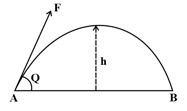Positive, Negative and Zero Work
Important Questions on Positive, Negative and Zero Work
A displacement of is caused in a body in the following different ways. In which case maximum work is done?
An object is thrown up at angle from point reaches to the point after rising through the height h as shown in diagram. The work done by the force of gravity is

No work is done when an object moves
A man carries a suitcase in his hand climbs up the stairs. The work done by the man is
A rocket rises up in the air due to the force generated by the fuel. The work done by the
A stone is a tied to a string and whirled in a circular path. The work done by stone is
In which case work is done?
In which case work is not done?
Work done is said to be negative, when a force causes displacement
Work done is said to be positive when a force causes displacement
It is possible that an object is in the state of accelerated motion due to external force due to on it, but no work is being done by the force. Explain it with an example.
State in each of the following cases, if work is done or not done, and why?
(a) A man pushing a wall.
(b) A girl climbing a staircase.
(c) A swimmer swimming in water.
(d) A standing man holding a suitcase in his hand.
(e) A lady cooking food.
(f) A porter carrying a heavy load, going down the stairs.
Is it possible that a force acts on a body, and still work done is zero? Support your answer by two examples.
In which of the following cases will the work done by a force be maximum: When the angle between the direction of force and displacement is, (i) zero (ii) ?
What do you understand by the terms (i) positive work (ii) negative work? Support your answer with an example.
When does a force do work? How is this work measured?
Give two examples of moving bodies, where no work is done.
Why is no work done, when a force acts at right angles to the direction of displacement?

